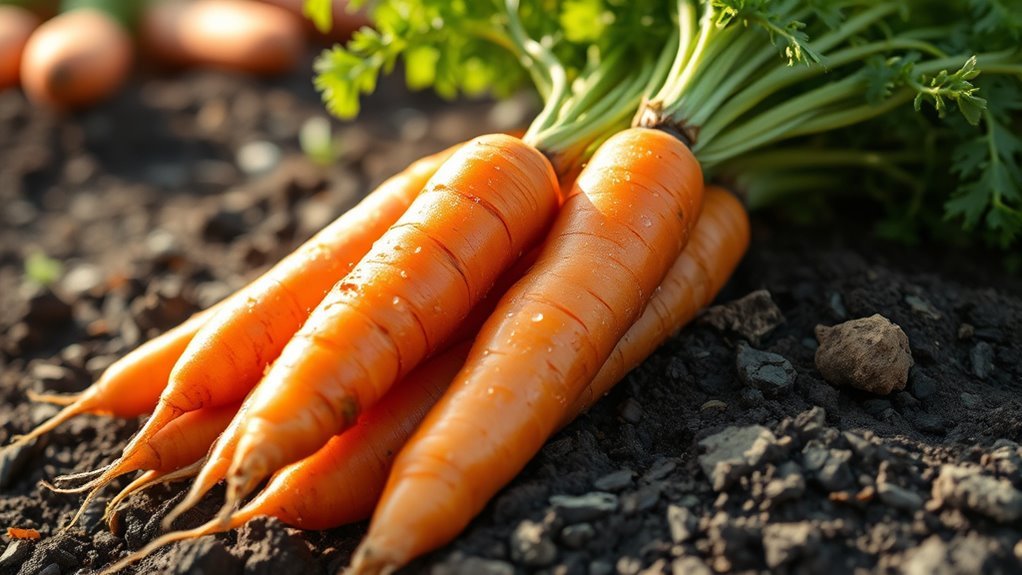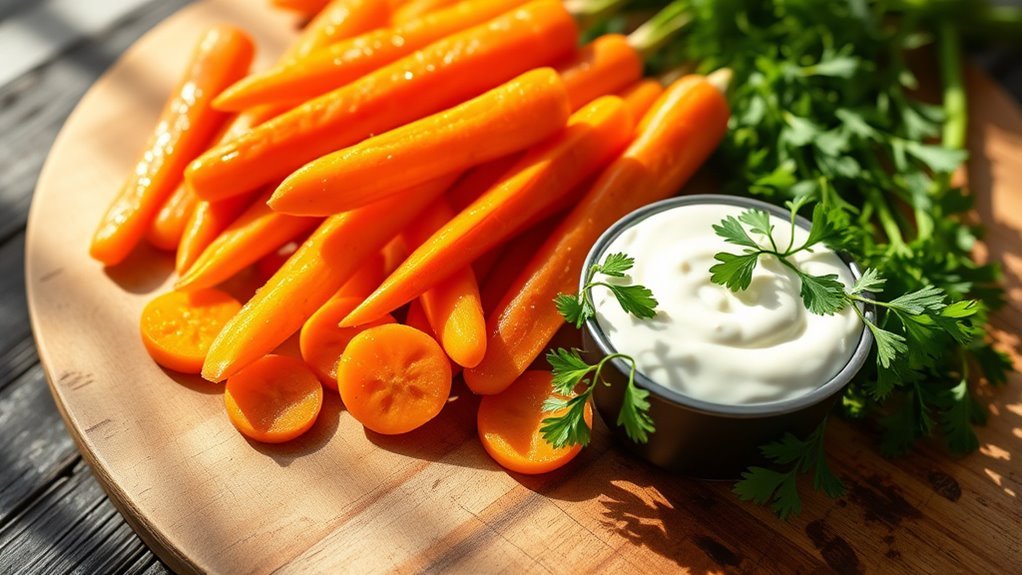Yes, you can eat carrots on a keto diet, but moderation is essential. A medium carrot has about 6 grams of carbs, and portion control is key—aim for half a cup, which typically contains around 3-4 grams of net carbs. Pairing carrots with healthy fats like guacamole can help balance carb intake. For lower-carb options, consider alternatives like radishes or zucchini. If you’re curious about incorporating carrots effectively, there are plenty of delicious ideas to explore.
Understanding Carbohydrates in Carrots

When considering a ketogenic diet, it’s essential to understand the carbohydrate content in foods, and carrots are no exception. Carrots contain primarily simple carbohydrates, which can impact your daily carb intake on keto. However, they also offer a notable fiber content, which can help offset some carbohydrate effects, as fiber isn’t digested like other carbs. This means that while carrots do contribute to your total carbs, the fiber can aid digestion and provide a sense of fullness. If you’re looking to enjoy carrots on a keto diet, moderation is key. Balancing your intake with other low-carb vegetables can give you the freedom to include a variety of flavors while staying within your carb limits.
Nutritional Profile of Carrots

When considering the nutritional profile of carrots, it’s important to look at their carbohydrate content, as well as the vitamins and minerals they provide. Carrots are low in calories but rich in essential nutrients, which can be beneficial for your overall health. Additionally, understanding their glycemic index can help you determine how they fit into your keto diet.
Carbohydrate Content Overview
Although carrots are often praised for their health benefits, their carbohydrate content can be a concern for those following a ketogenic diet. A medium carrot contains about 6 grams of carbohydrates, which can add up quickly if you’re aiming for a daily limit of around 20-50 grams. When you do a carbohydrate comparison with other vegetables, options like leafy greens or cucumbers offer considerably lower carb counts, making them more suitable for keto. However, if you really enjoy carrots, you might consider incorporating them in moderation. Balancing your intake with low carb options can help you maintain your desired ketosis while still enjoying the flavors you love. It’s all about finding what works best for your personal lifestyle.
Vitamins and Minerals Richness
Carrots are not just crunchy and sweet; they’re also packed with essential vitamins and minerals that can contribute to your overall health. Their nutrient density makes them a fantastic addition to your diet, especially if you’re looking for low-calorie options. Carrots are rich in vitamin A, which supports vision and immune function, as well as vitamins K and C, potassium, and fiber. These nutrients offer various health benefits, from promoting skin health to aiding digestion. While being mindful of your carbohydrate intake, incorporating carrots in moderation can still provide you with these crucial nutrients without overwhelming your keto goals. Enjoying carrots can be a delicious way to boost your nutrient intake while embracing a healthy lifestyle.
Glycemic Index Considerations
How do carrots fit into a keto diet when considering their glycemic index? Carrots have a glycemic index (GI) of around 41, which is relatively low, but their glycemic load (GL) matters too. A serving of carrots can contribute to your daily carb intake, especially if you eat them in larger quantities. If you’re mindful of carbohydrate timing, you can enjoy them in moderation, perhaps pairing them with healthy fats to balance your meal. This approach can help maintain your ketosis while still allowing for some flexibility. Overall, while carrots aren’t the most keto-friendly vegetable, they can be included in your diet thoughtfully, ensuring you stay within your carb limits without sacrificing variety.
Carrots and Their Glycemic Index

When considering carrots on a keto diet, understanding their glycemic index (GI) is essential. Carrots have a moderate GI, which means they can impact your blood sugar levels, especially if consumed in larger portions. To enjoy carrots while staying mindful of your carb intake, it’s important to practice portion control.
Carrots’ Glycemic Index Explained
Although often celebrated for their health benefits, carrots have a glycemic index (GI) that can raise questions for those following a ketogenic diet. With a GI of around 41, they fall into the low to moderate category, meaning they can cause a moderate glycemic response. This might not be alarming for everyone, but if you’re strictly monitoring your carb intake, it’s essential to contemplate portion sizes. Carrots are packed with vitamins and antioxidants, making them nutritious, but you’ll want to balance their consumption with your overall carb goals. By understanding their GI and how they fit into your diet, you can enjoy the benefits of carrots without compromising your keto lifestyle.
Impact on Blood Sugar
While many people appreciate carrots for their crunch and sweetness, it’s important to understand how they can affect blood sugar levels, especially for those on a ketogenic diet. Carrots have a moderate glycemic index, which means they can trigger a noticeable blood sugar response. Here are some considerations:
- Eating raw carrots can provide a satisfying crunch.
- Cooking carrots may increase their sugar content.
- Pairing carrots with healthy fats can help moderate blood sugar spikes.
- The fiber in carrots can support digestive health.
When you include carrots in your meals, be mindful of how they interact with your overall carb intake. Balancing your diet can help you maintain stable blood sugar levels without feeling deprived.
Portion Control Recommendations
Portion control is essential when incorporating carrots into a ketogenic diet, especially due to their moderate glycemic index of around 41. To enjoy carrots without compromising your keto goals, consider keeping portion sizes to about half a cup. This typically contains around 3-4 grams of net carbs, which can fit into your daily carb limit.
For serving suggestions, try pairing your carrots with a high-fat dip like guacamole or ranch dressing to balance the carbs with healthy fats. Alternatively, you can roast or sauté them with oil and spices for added flavor. By being mindful of portion sizes and creative with serving suggestions, you can enjoy carrots while staying within your desired carb range on keto.
How Many Carbs Are in a Serving of Carrots?
When considering a keto diet, understanding the carbohydrate content of foods like carrots is essential for maintaining your daily limits. A standard serving of raw carrots (about 100 grams) contains roughly 9 grams of carbs, making it important to choose wisely among carrot varieties.
- Crunchy baby carrots
- Sweet, earthy orange carrots
- Colorful purple and yellow varieties
- Roasted or steamed preparations
Different cooking methods can also impact the carb count slightly, as cooking may break down some fiber. While you can enjoy carrots in moderation, it’s vital to monitor your overall intake. By being mindful of serving sizes and preparation styles, you can incorporate a little carrot goodness without derailing your keto journey.
Incorporating Carrots Into a Keto Diet
Although carrots can be higher in carbs compared to other low-carb vegetables, you can still incorporate them into your keto diet with careful planning. Focus on moderation; consider using small amounts in keto-friendly recipes like stir-fries or salads to enjoy their flavor without exceeding your carb limits. You might also try pairing carrots with high-fat dips, like guacamole or ranch dressing, to balance their carb content. If you’re looking for alternatives, think about carrot substitutes like radishes or zucchini, which have fewer carbs and can replicate some textures. With creativity, you can enjoy the sweetness of carrots while staying on track with your keto lifestyle. Remember, it’s all about balance and mindful eating.
Alternative Low-Carb Vegetables
If you’re looking for alternatives to carrots that fit better within your keto diet, several low-carb vegetables can provide similar textures and flavors without the higher carbohydrate content. These keto friendly alternatives not only taste great but also help you stay within your carb limits. Here are some excellent low carb options to evaluate:
- Zucchini: Versatile and great for spiralizing.
- Radishes: Crunchy with a peppery kick, perfect for roasting.
- Cauliflower: A fantastic substitute for rice or mash.
- Broccoli: Packed with nutrients and adds a satisfying crunch.
Incorporating these vegetables can enhance your meals while keeping your carb count in check. Enjoy the freedom to create delicious, keto-friendly dishes without the guilt!
Tips for Enjoying Carrots on Keto
Carrots can be enjoyed on a keto diet, but moderation is key due to their higher carbohydrate content compared to other vegetables. You can incorporate them into your meals by using creative carrot recipes that align with your macros. Consider roasting them with olive oil and herbs for a flavorful side dish, or making a low-carb carrot salad with a tangy dressing. For keto snacks, try baby carrots paired with a high-fat dip like guacamole or cream cheese. Just remember to track your carb intake; a small portion can fit into your daily allowance without derailing your goals. With mindful choices, you can savor the natural sweetness of carrots while staying on track with your keto lifestyle.
Conclusion: Balancing Carrots in Your Keto Journey
Incorporating carrots into your keto journey can be a delightful experience when approached with a mindful strategy. Remember, achieving keto success isn’t just about restriction; it’s about balance and vegetable moderation. Here’s how to enjoy carrots without derailing your goals:
- Savor raw carrot sticks with creamy dips.
- Roast baby carrots for a sweet, caramelized treat.
- Toss shredded carrots into salads for added crunch.
- Blend carrots into smoothies for a nutrient boost.
Frequently Asked Questions about Eating Carrots on Keto
1. Can I eat carrots on a keto diet?
Yes, you can eat carrots on a keto diet, but with moderation. Carrots are higher in carbohydrates compared to other low-carb vegetables, which might affect your daily carb limit. A medium-sized carrot has about 6 grams of net carbs, so if you choose to include them, be sure to account for these carbs within your overall daily intake to stay within your keto goals.
2. How many carbs are in carrots?
Carrots contain approximately 9 grams of carbohydrates per 100 grams, with about 3 grams of fiber. This means that the net carbs (total carbs minus fiber) are around 6 grams per 100 grams of carrots. It’s important to remember that while carrots do contain carbs, they also provide essential vitamins and minerals, which can be beneficial for overall health.
3. What are some low-carb alternatives to carrots?
If you’re looking for low-carb alternatives to carrots while following a keto diet, consider options like celery, zucchini, bell peppers, or cucumbers. These vegetables are lower in carbohydrates and can be used in salads, dips, or as snacks without significantly impacting your daily carb intake.
4. Are cooked carrots more keto-friendly than raw carrots?
Cooking carrots does not significantly alter their carbohydrate content. However, cooking can change the glycemic index of carrots, potentially making them easier to digest. While both raw and cooked carrots can be included in moderation on a keto diet, it’s essential to monitor your portion sizes to ensure you stay within your daily carb limits.
5. Can I enjoy carrots in keto-friendly recipes?
Absolutely! Carrots can be incorporated into keto-friendly recipes by using them in moderation. Consider adding small amounts of grated carrots to salads, soups, or stir-fries for flavor and texture. You can also make a low-carb carrot cake using almond flour or coconut flour to reduce the overall carb count while still enjoying the taste of carrots.
References
- https://www.healthline.com/nutrition/keto-diet-foods#vegetables
- https://www.ncbi.nlm.nih.gov/pmc/articles/PMC6465940/
- https://www.usda.gov
- https://www.dietdoctor.com/low-carb/keto/vegetables
- https://www.webmd.com/diet/obesity/ss/slideshow-keto-diet-foods
- https://www.mayoclinic.org/healthy-lifestyle/nutrition-and-healthy-eating/expert-answers/keto-diet/faq-20406983


